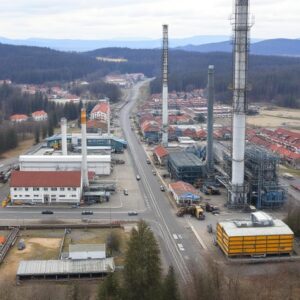
**Robert Plant Opens Up About the Golden Years of Led Zeppelin in Candid Interview**
In a rare and revealing interview, legendary rock frontman Robert Plant has offered a deeply personal look back at the golden years of Led Zeppelin, the iconic band that redefined rock music in the 1970s. Speaking with honesty, humor, and a touch of nostalgia, Plant recounted the formative moments, explosive fame, and enduring legacy of one of the most influential groups in rock history.
Plant, now in his seventies, described the early chemistry between him, guitarist Jimmy Page, bassist and keyboardist John Paul Jones, and drummer John Bonham as “alchemical.” “We were all different in personality,” he said, “but when we got into a room and started playing, it was like something else took over. We were chasing a sound that hadn’t existed yet, and that chase was what kept us going.”
The band’s rise was meteoric after the release of their debut album *Led Zeppelin* in 1969. “We didn’t have a long runway,” Plant recalled. “That first record exploded, and suddenly we were playing shows across the world. It was chaotic, beautiful, and totally consuming.”
He spoke at length about the band’s creative process, which often blurred the lines between structured songwriting and spontaneous improvisation. “There were nights when we’d go off-script in the middle of a song, and it would become something entirely new. That was the magic of Zeppelin. We were fearless on stage.”
The “golden years,” as Plant calls them, stretched from 1969 through the mid-1970s, with landmark albums like *Led Zeppelin IV*, *Physical Graffiti*, and *Houses of the Holy* defining the era. Tracks like “Stairway to Heaven,” “Kashmir,” and “Whole Lotta Love” became cultural touchstones.
Yet Plant was quick to point out that behind the scenes, the band also faced internal tensions and the darker sides of fame. “We were young and often reckless,” he said. “Success came at a cost. There were excesses, misunderstandings, and the pressure to always top what came before. It could be overwhelming.”

Perhaps the most poignant moments of the interview came when Plant spoke about drummer John Bonham, who died in 1980, leading to the band’s dissolution. “Bonzo was the heart of Zeppelin. He played like a thunderstorm—pure power and precision. Losing him wasn’t just the end of the band, it was like losing a part of myself.”
Despite refusing numerous offers for a full Led Zeppelin reunion over the years, Plant remains proud of what the band achieved. “We said what we needed to say. We did it with passion, and we left something timeless behind.”
Plant also reflected on how his own understanding of those years has changed with time. “When you’re in it, you don’t always appreciate it. You’re moving too fast. Now, I can look back and see the craft, the camaraderie, the risks we took. It was a wild ride, and I wouldn’t change a thing.”
While Led Zeppelin’s active years ended over four decades ago, their influence endures. New generations continue to discover the band’s music, and Plant finds that deeply gratifying. “To see young kids connect with our songs, to see them light up when ‘Immigrant Song’ kicks in—that tells me we did something right.”
In the end, Robert Plant’s candid reflections are less about nostalgia and more about gratitude. “It was a moment in time when the stars aligned. We were lucky, we were bold, and we made something that still speaks to people. That’s the golden part.”
As the interview closed, Plant smiled and added, “Zeppelin wasn’t just a band—it was a force of nature. And for a while, we got
to ride the lightning.”







